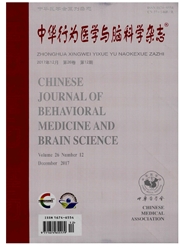

 中文摘要:
中文摘要:
提出了一种基于多通道匹配追踪算法对一维多通道脑磁图非平稳信号进行单次分解的方法.单通道匹配追踪算法通过在过完备的库中自适应地搜索匹配具有良好时频特性的Gabor原子,最终将信号表示为Gabor原子的线性组合.多通道匹配追踪算法是单通道匹配追踪算法的延伸,即所有通道的信号是由发生时间、振荡频率、相位、持续时间相同,但振幅不同的Gabor原子线性叠加组成.结果显示,多通道匹配追踪算法能较好地重建源信号,并且自动检测与分离伪迹噪声.此外,3D源重建结果和心理学先验知识一致,这进一步表明多通道匹配追踪算法应用于脑磁信号单次提取是有效的.
 英文摘要:
英文摘要:
A multichannel matching pursuit(MMP)algorithm is proposed to decompose the one-dimensional multichannel non-stationary magnetoencephalography(MEG)signal at a single-trial level.The single-channel matching pursuit(MP)linearly decomposes the signal into a set of Gabor atoms,which are adaptively chosen from an overcomplete dictionary with good time-frequency characters.The MMP is the extension of the MP,which represents multichannel signals using linear combination of Gabor atoms with the same occurrence,frequency,phase,and time width,but varying amplitude in all channels.The results demonstrate that the MMP can optimally reconstruct the original signal and automatically remove artifact noises.Moreover,the coherence between the 3D source reconstruction and the prior knowledge of psychology further suggests that the MMP is effective in MEG single-trial processing.
 同期刊论文项目
同期刊论文项目
 同项目期刊论文
同项目期刊论文
 Multichannel matching pursuit of MEG signals for discriminative oscillation pattern detection in dep
Multichannel matching pursuit of MEG signals for discriminative oscillation pattern detection in dep 期刊信息
期刊信息
